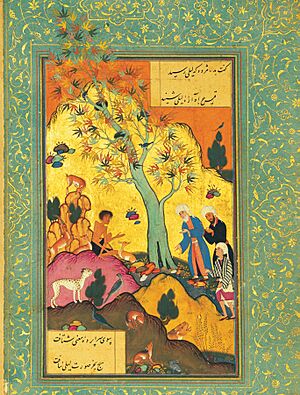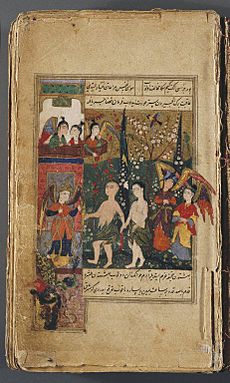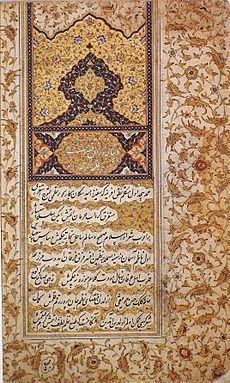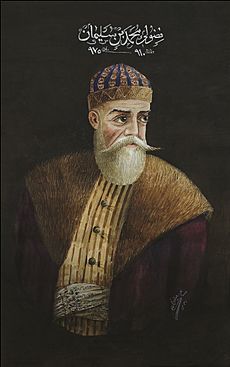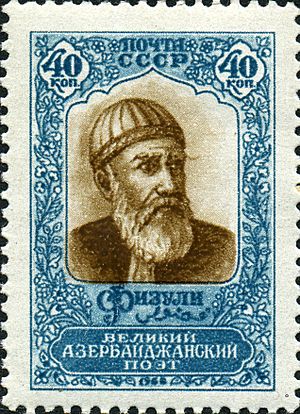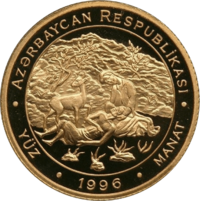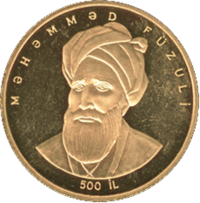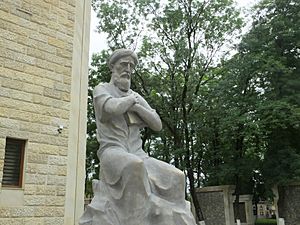Fuzuli (writer) facts for kids
Quick facts for kids
Fuzuli
|
|
|---|---|
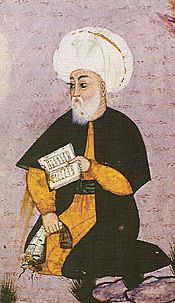
Miniature of Fuzuli in 16th century Meşâirü'ş-şuarâ
|
|
| Born | Mahammad Suleyman oghlu c. 1494 Karbala, Aq Qoyunlu confederation (now Iraq) |
| Died | 1556 Karbala, Ottoman Empire (now Iraq) |
| Genre | Azerbaijani, Arabic and Persian epic poetry, wisdom literature |
| Notable works | The Epic of Layla and Majnun (Leyli və Məcnun) |
Mahammad bin Suleyman (born around 1494 – died 1556), better known by his pen name Fuzuli, was a famous poet, writer, and thinker from the 16th century. He wrote in three languages: his native Azerbaijani, as well as Arabic and Persian.
Fuzuli is considered one of the most important poets in the divan tradition of Azerbaijani literature. A "divan" is a collection of poems. He wrote his collected poems in all three languages. He is also seen as one of the greatest Ottoman poets. He knew a lot about different Turkic languages and also studied mathematics and astronomy.
Contents
Life of Fuzuli
Fuzuli was born around 1480 in what is now Iraq. At that time, the area was ruled by the Aq Qoyunlu Turkoman people. He was likely born in either Karbala or An Najaf. Fuzuli was an Azerbaijani from the Oghuz Bayat tribe. This tribe was spread across the Middle East, Anatolia, and the Caucasus. Even though his family had been nomads before, they had settled in towns a long time ago.
His Education and Languages
Fuzuli probably had a very good education. First, his father taught him. His father was a mufti, which is a Muslim legal expert, in the city of Al Hillah. Later, Fuzuli studied with a teacher named Rahmetullah. During this time, he learned Persian and Arabic, in addition to his first language, Azerbaijani.
How He Chose His Pen Name
One interesting thing we know about Fuzuli's life is how he picked his pen name. A "pen name" is a fake name a writer uses. In the introduction to his Persian poems, he explained that when he first started writing, he would choose a pen name, but then someone else would already be using it.
So, he decided to use the Arabic word fuzûlî. This word literally means "impertinent," "improper," or "unnecessary." He chose it because he knew "this title would not be acceptable to anyone else."
However, the name has a double meaning. This is called tevriyye in Ottoman Divan poetry. Fuzuli himself explained that fuzûl is also the plural of fazl, which means "learning." It sounds similar to words like ‘ulûm ("sciences") and fünûn ("arts"). So, his name hinted that he was full of knowledge and arts.
Life Under Ottoman Rule
In 1534, the Ottoman sultan Süleymân I took over the region of Baghdad, where Fuzuli lived. This gave Fuzuli a chance to become a court poet for the Ottomans. He wrote many kasîdes, which are poems of praise, for the sultan and his officials. Because of this, he was promised a regular payment, called a stipend.
However, due to the complicated Ottoman bureaucracy (the system of government offices), he never actually received this payment. In one of his most famous works, a letter called Şikâyetnâme ("Complaint"), Fuzuli wrote about the problems with the bureaucracy and corruption:
- سلام وردم رشوت دگلدر ديو آلمادىلر
- Selâm verdim rüşvet değildir deyü almadılar.
- I gave my greetings but they didn't receive it as it wasn't a bribe.
Even though his poetry became very popular during this time, he never became rich. Most of his life was spent near the Tomb of `Alî in the city of an-Najaf, south of Baghdad. He died in 1556 during a plague outbreak in Karbalā’. He might have died from the plague itself or from cholera.
Fuzuli's Works
Fuzuli is best known as a poet of love. He even agreed with this description himself:
- مندن فضولی ايستمه اشعار مدح و ذم
- من عاشقام هميشه سوزوم عاشقانه دیر
- Menden Fuzûlî isteme eş'âr-ı medh ü zem
- Men âşıkam hemîşe sözüm âşıkânedür
- Don't ask Fuzuli for poems of praise or blame
- I am a lover and speak only of love
Fuzuli's idea of love was deeper than just romantic love. It was more like the Sufi idea of love, where love is a way to connect with God. Even though Fuzuli didn't belong to a specific Sufi group, his poems show this spiritual understanding.
He wrote:
- عاشق ايمش هر ن وار ﻋﺎﻝﻢ
- ﻋلم بر قيل و قال ايمش آنجق
- ‘Âşık imiş her ne var ‘âlem
- ‘İlm bir kîl ü kâl imiş ancak
- All that is in the world is love
- And knowledge is nothing but gossip
The first line means that everything in the world is connected to love, which for Fuzuli, was a way to understand God's presence everywhere.
Layla and Majnun
Fuzuli explored this idea of love most deeply in his long poem Dâstân-ı Leylî vü Mecnun. This poem tells the classic Arabian love story of Layla and Majnun. In Fuzuli's version, he focuses on the pain Majnun feels when he is separated from his beloved Layla. Fuzuli saw this pain as a key part of love itself.
For Fuzuli, the suffering that comes with love helps a person get closer to "the Real" (al-Haqq). This is one of the 99 names of God in Islam, meaning God. So, for Fuzuli, love and its challenges were a path to spiritual understanding.
Legacy of Fuzuli
In April 1959, to honor 400 years since his death, the Karyagin district and the city of Fuzuli (city) were renamed Fuzuli. A street and a square in the center of Baku are named after him, as well as streets in many other cities in Azerbaijan. Several Azerbaijani institutions, like the Institute of Manuscripts in Baku, also carry his name.
In 1996, the Central Bank of Azerbaijan created special golden and silver commemorative coins. These coins celebrated the 500th anniversary of Fuzuli's birth and his important work.
See also
 In Spanish: Fuzûlî para niños
In Spanish: Fuzûlî para niños
 | John T. Biggers |
 | Thomas Blackshear |
 | Mark Bradford |
 | Beverly Buchanan |


